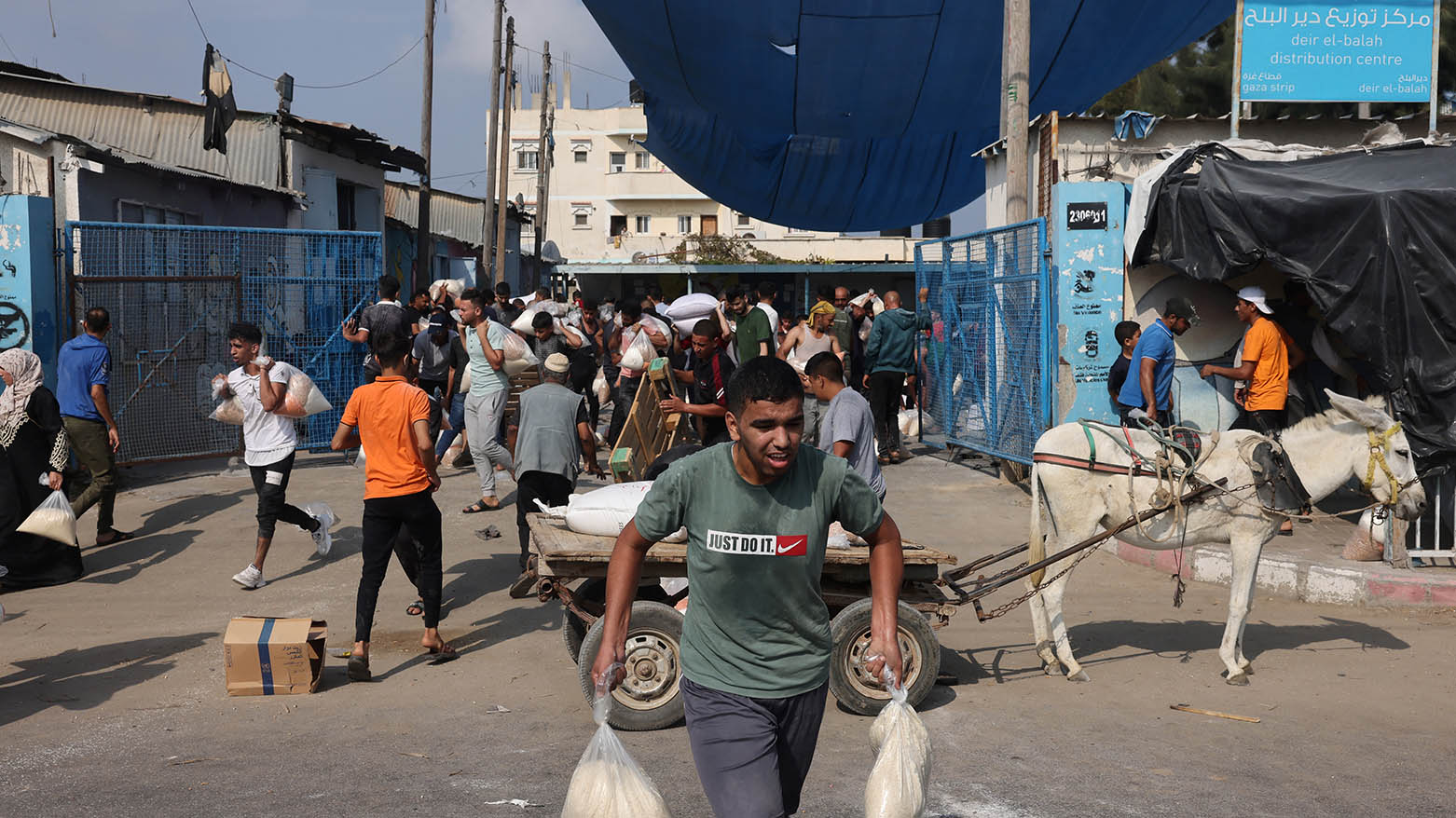Thousands break into aid warehouses in Gaza as deaths top 8,000 and Israel widens ground offensive

DEIR AL-BALAH, Gaza Strip (AP) — Thousands of people broke into aid warehouses in Gaza to take flour and basic hygiene products, a U.N. agency said Sunday, in a mark of growing desperation and the breakdown of public order three weeks into the war between Israel and Gaza's militant Hamas rulers.
Tanks and infantry pushed into Gaza over the weekend as Israeli Prime Minister Benjamin Netanyahu announced a “second stage” in the war, which was ignited by Hamas' brutal Oct. 7 incursion into Israel. Israel also pounded the territory from air, land and sea.
Gaza's Health Ministry said the death toll among Palestinians has passed 8,000 — mostly women and minors. It's a toll without precedent in decades of Israeli-Palestinian violence, and one that is expected to climb even more rapidly as Israel presses its ground offensive. Over 1,400 people have died on the Israeli side, mainly civilians killed during the initial Hamas onslaught.
The bombardment over the weekend — described by Gaza residents as the most intense of the war — knocked out most communications in the territory late Friday, largely cutting off the besieged enclave’s 2.3 million people from the world. Communications were restored to much of Gaza early Sunday.
The Israeli military said Sunday it had struck over 450 militant targets over the past 24 hours, including Hamas command centers and anti-tank missile launching positions. It said more ground forces were sent into Gaza overnight, and circulated footage showing tanks and troops operating in open areas.
The warehouse break-ins were “a worrying sign that civil order is starting to break down after three weeks of war and a tight siege on Gaza," said Thomas White, Gaza director for the U.N. agency for Palestinian refugees, known as UNRWA. "People are scared, frustrated and desperate.”
UNRWA provides basic services to hundreds of thousands of people in Gaza. Its schools across the territory have been transformed into packed shelters housing Palestinians displaced by the conflict. Israel has allowed only a small trickle of aid to enter from Egypt, some of which was stored in one of the warehouses that was broken into, UNRWA said.
Juliette Touma, a spokesperson for the agency, said the crowds broke into four facilities on Saturday. She said the warehouses did not contain any fuel, which has been in critically short supply since Israel cut off all shipments after the start of the war.
Residents living near Shifa Hospital, Gaza's largest, meanwhile said Israeli airstrikes overnight hit near the hospital complex and blocked many roads leading to it. Israel accuses Hamas of having a secret command post beneath the hospital but has not provided much evidence.
Tens of thousands of civilians are sheltering in Shifa, which is also packed with wounded patients.
“Reaching the hospital has become increasingly difficult,” Mahmoud al-Sawah, who is sheltering in the hospital, said over the phone. “It seems they want to cut off the area.” Another Gaza City resident, Abdallah Sayed, said the Israeli bombing over the past two days was “the most violent and intense” since the war started.
The Israeli army recently released computer-generated images showing what it said were Hamas installations in and around Shifa Hospital, as well as interrogations of captured Hamas fighters who might have been speaking under duress. Israel has made similar claims before, but has not substantiated them.
Little is known about Hamas’ tunnels and other infrastructure, and the claims could not be independently verified. Hamas’ government denied the allegations and said they were aimed at justifying future strikes on the hospital.
The Palestinian Red Crescent rescue service said another Gaza City hospital received two calls from Israeli authorities on Sunday ordering it to evacuate. It said airstrikes have hit as close as 50 meters (yards) from the Al-Quds Hospital, where 12,000 people are sheltering.
Israel had ordered the hospital to evacuate more than a week ago, but it and other medical facilities have refused, saying it would mean death for patients on ventilators.
There was no immediate Israeli comment on the latest evacuation order or the strikes near Shifa.
Israel says most residents have heeded its orders to flee to the southern part of the besieged territory, but hundreds of thousands remain in the north, in part because Israel has also bombarded targets in so-called safe zones.
An Israeli airstrike hit a two-story house in the southern city of Khan Younis on Sunday, killing at least 13 people, including 10 from one family. The bodies were brought to the nearby Nasser Hospital, according to an Associated Press journalist at the scene.
The escalation has meanwhile ratcheted up domestic pressure on Israel's government to secure the release of some 230 hostages seized in the Oct. 7 rampage, when Hamas fighters from Gaza breached Israel's defenses and stormed into nearby towns, gunning down civilians and soldiers in a surprise attack.
Desperate family members met with Netanyahu on Saturday and expressed support for an exchange for Palestinian prisoners held in Israel.
Hamas says it is ready to release all hostages if Israel releases all of the thousands of Palestinians held in its prisons. Israel has dismissed the offer.
Netanyahu said Saturday that Israel is determined to bring back all the hostages, and that the expanding ground operation “will help us in this mission.”
“This is the second stage of the war, whose objectives are clear: to destroy the military and governmental capabilities of Hamas and bring the hostages home,” he said in a televised address.
The Israeli military said it was gradually expanding its ground operations inside Gaza, while stopping short of calling it an all-out invasion. Casualties on both sides are expected to rise sharply as Israeli forces and Palestinian militants battle in dense residential areas.
Despite the Israeli offensive, Palestinian militants have continued firing rockets into Israel, with the constant sirens in southern Israel a reminder of the threat.
The Palestinian death toll in Gaza rose Saturday to just over 8,000 people since the war began. according to the Gaza Health Ministry. That includes more than 3,300 minors and more than 2,000 women, the ministry said.
An estimated 1,800 people remain trapped beneath the rubble, according to the Health Ministry, which has said it bases its estimates on distress calls it received.
Israel says its strikes target Hamas fighters and infrastructure and that the militants operate among civilians, putting them in danger.
More than 1.4 million people across Gaza have fled their homes, nearly half crowding into U.N. schools and shelters, following repeated warnings by the Israeli military that they would be in danger if they remained in northern Gaza.
Gaza's sole power plant shut down shortly after the start of the war, and Israel has allowed no fuel to enter, saying Hamas would use it for military purposes.
Hospitals are struggling to keep emergency generators running to operate incubators and other life-saving equipment, and UNRWA is also trying to keep water pumps and bakeries running to meet essential needs.
